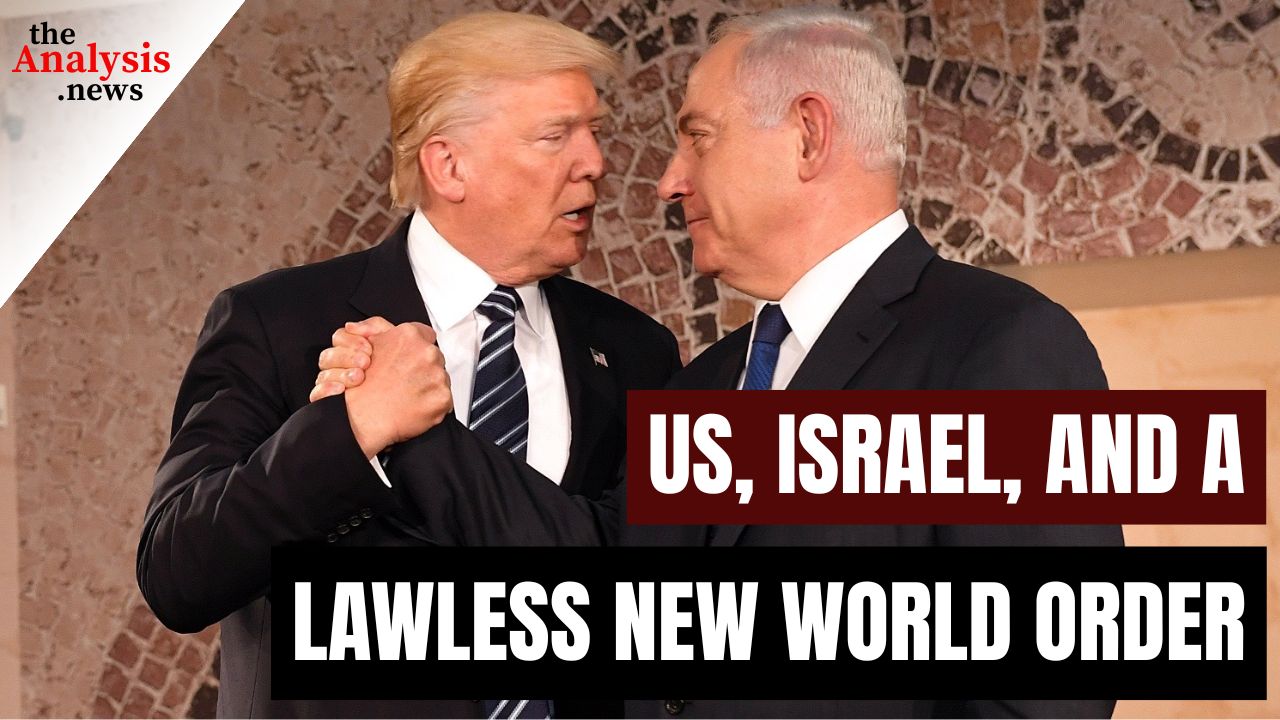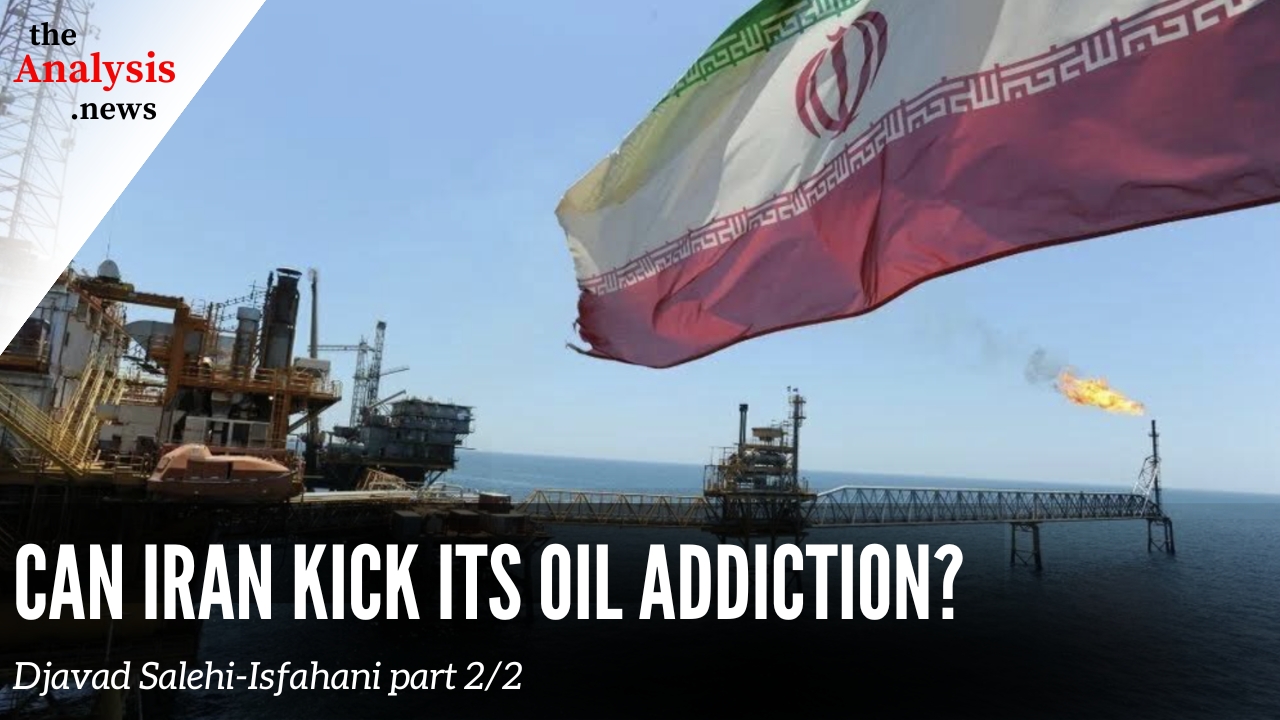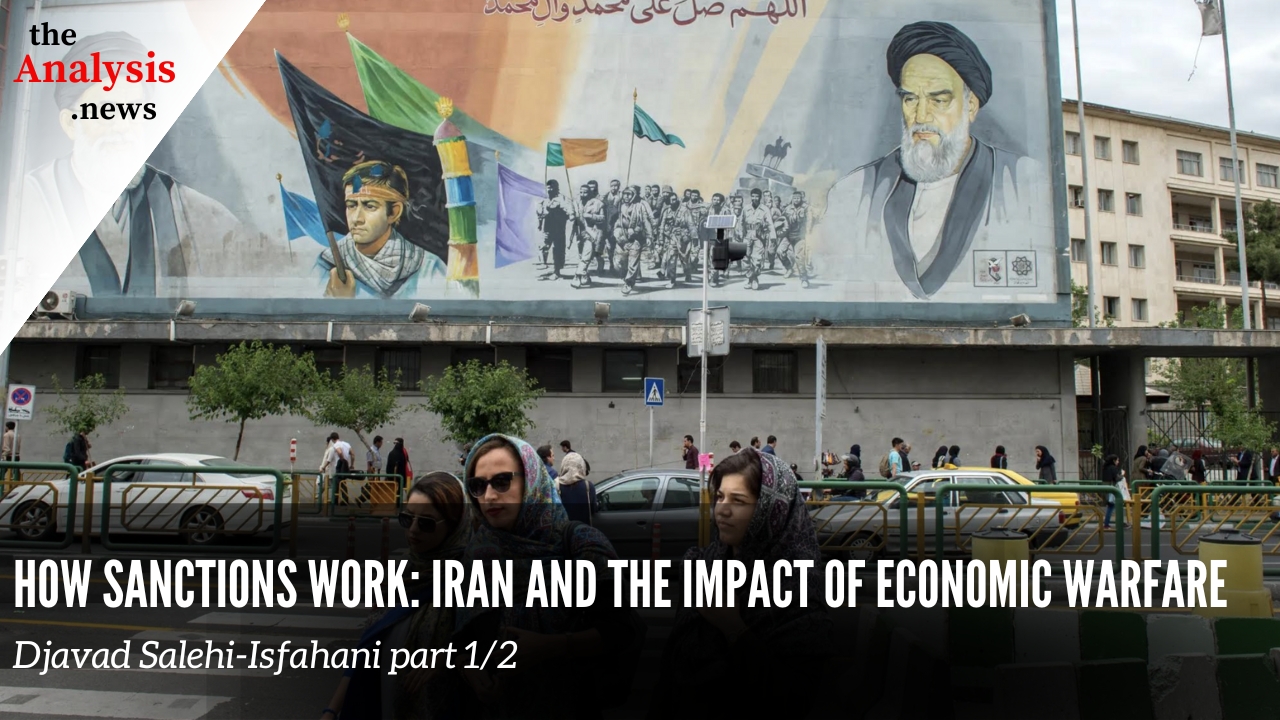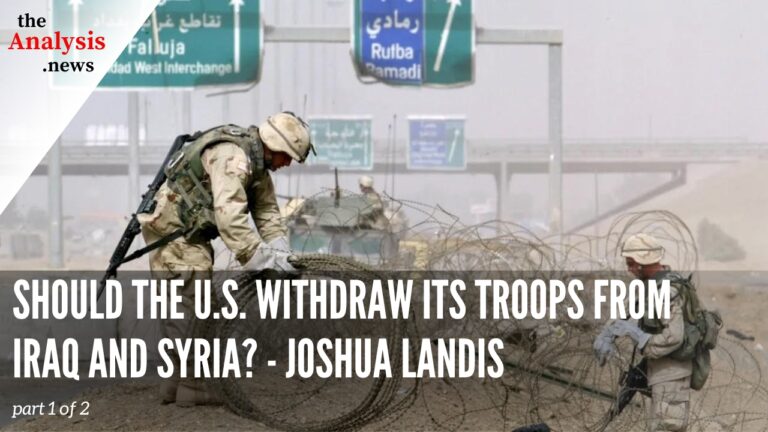The Biden administration has been pursuing a reckless policy in the Middle East in which Israel’s massacres in Gaza and now in Lebanon are unconditionally supported with deliveries of 2,000 lb bunker-busting bombs and diplomatic cover. Col. Larry Wilkerson, who served as former Chief of Staff to U.S. Secretary of State Colin Powell, discusses Iran’s policy of strategic patience in which a response to Israel’s extra-judicial killing of Hamas leader Ismail Haniyeh in Tehran in July, as well as a fatal strike on Hezbollah leader Hassan Nasrallah, possibly came too late according to Iran’s hardliners.
Talia Baroncelli
Hi, I’m Talia Baroncelli, and you’re watching theAnalysis.news. I’ll shortly be joined by Colonel Larry Wilkerson, who’s a friend of the show. We’ll be speaking about Iran’s attacks on Israel. They launched over 200 missiles, as well as Israel’s attacks on Lebanon, which have killed thousands of people and displaced over a million civilians, many of whom have actually gone back to Syria to find refuge there.
If you like the work that we do, you can support us by going to our website, theAnalysis.news, and hit the donate button at the top right corner of the screen. Make sure you get onto our mailing list; that way, you’re always notified every time we publish a new interview. You can like and subscribe to this show on Spotify or other streaming services such as Apple or YouTube. See you in a bit with Larry.
Joining me now is Colonel Larry Wilkerson. He’s a retired Colonel who served in the U.S. Army for 32 years. He was Chief of Staff for Secretary of State Colin Powell from 2002 to 2005 and worked for Colin Powell when Powell was the Chairman of the Joint Chiefs of Staff during the first Gulf War. Thanks so much for joining me today, Larry.
Col Lawrence Wilkerson
Good to be with you, Talia.
Talia Baroncelli
We just saw that Iran has launched over 200 missiles at Israel. The Iranian Islamic Revolutionary Guard Corps says the attacks are in retaliation for Israel’s killing of Ismail Haniyeh, the Hamas leader who was visiting Tehran, visiting Iranian President Masoud Pezeshkian, for his inauguration. It was a really big event, and he was killed there. Of course, Hassan Nasrallah was just assassinated by the IDF, along with another IRGC leader. What do you make of this attack? Is this symbolic? Is this trying to reestablish “deterrence,” or is this a more serious escalation on the part of the Iranians?
Col Lawrence Wilkerson
First, let me say that one of your remarks there leads me to comment on what I think is an extraordinarily dangerous development in the world, and that’s the assassination of members of other governments. Of course, the United States joined that when we, under Trump, assassinated Qasem Soleimani, a member of the Iranian government. It doesn’t matter that we detest the Iranian government; that’s immaterial. He was a member of that government. Hassan Nasrallah was the same thing, a member of the Lebanese government. This is not a good thing to have started. Israel and the United States are the people who have started it. Israel has perfected it, brought it to a quintessential place where it seems like any time they want to take out somebody’s leader, they take them out.
As to your more direct question, I think this is probably Iran’s attempt to square the circle, as it were. In other words, to not be seen as delinquent by those who would take it with great umbrage if they didn’t respond to the egregious killing of Ismail Haniyeh inside Tehran on the election or on the inauguration day of the new president and at the same time not start a war with the United States.
What you’re seeing, and maybe this is all of it, I don’t know, there may be more, is that balance, trying to balance that. I think it’s actually occurred within the governing circles of Iran, where you had the new president who is really more concerned with getting sanctions relief for his people and doing the deal with the United States, not the Perm 5 plus Germany. No, he wants to do the United States, period. He wants to get a nuclear deal, and he wants to get some sanctions relief out of that nuclear deal. That’s his primary purpose, I think. On the other side of that coin, you’ve got the other people in Iran who are not on that sheet of music at all, like the Ayatollah, for example, the Guardian Council, probably, and other people in the background.
One wonders where [Mohammad Javad] Zarif is in all this. I suspect he’s on the president’s side, but Zarif is always a survivor or tries to be. I mention him because I think he’s one of the most capable politicians and thinkers in the Iranian government. So that’s what it is. It’s an attempt to balance those two pressures. They really significantly do not want war with the United States, nor does Washington want war with them. I would call that the only sane belief, almost, that Washington has these days about its military might. They do not want to expand it on Iran.
We’ll see where it goes from here. Much of it’s going to depend on what these 41,000 troops that just invaded Lebanon declared by the IDF leadership a limited excursion in order to create enough space to allow Israelis to move back into their homes. Good luck there. Fat chance of that happening. It won’t go any further like it did in what: ’78, ’82, ’06. They’ve invaded Lebanon four times. One time, they stayed there in ’82. They stayed there, what, 15 years, I think. We really were the ones who had to bail their little butts out of the place eventually. Then on their way out, they managed to slaughter a whole bunch of people in two refugee camps. Typical Israeli performance.
One wonders if this can be stopped. In other words, is this the last we’ll hear from Iran? Is it the last we’ll hear from Israel vis à vis Iran? I doubt it. I doubt it very seriously. The Iranians are playing a very dangerous game here, trying to maintain a balance, as was Nasrallah, trying to maintain a balance. He was a man who was very circumstanced. He was a man who only hit military targets when he did shoot at Israel, and he was a man who didn’t want the war to expand. They took him out. Beware when you take a leader out that the second in command, the third in command, or even the fourth in command if you keep taking them out, isn’t worse than what you had before. I think Israel has learned that in the past, but they don’t learn the lesson. They just keep on taking people out.
I think the crunch here is going to be what happens in Lebanon and, to a certain extent, what keeps on happening in Gaza. Think about this for a moment. If you’re a troop in Gaza and you’re really fed up with it, and I’m told by reliable sources that many of the IDF troops in Gaza are fed up with it, and you’re looking at an invasion, literally, starting on your other border into Lebanon, and missiles are raining down on your families who are already egressing Israel at alarming numbers, what do you think? Where’s your morale? Your family is being threatened back there now. Where’s your morale if you’re in the IDF? I don’t know. I don’t know anyone well enough in the IDF, or trust anyone, I should say, anymore in the IDF to take a gage of it. But it can’t be good. It just can’t be good.
Then you’ve got the battle going on between Netanyahu, the chief of staff of the IDF, and the other leadership of the IDF, and they don’t see in the same directions often, strategically or otherwise. This is a parlous time for Israel, in my view.
Talia Baroncelli
Well, let’s just give some context to how many people have actually died because Haaretz, which is a newspaper in Israel, has reported that the IDF is actually underestimating or undercounting how many of its own soldiers and reservists have died in their onslaught a lot on the Gaza Strip. It’s probably closer to 3,000 people. They’ve been underreporting that.
Col Lawrence Wilkerson
I think it’s even higher than that. I think it’s closer to five. We’ve perfected the battlefield as it is today. We did the same thing in Afghanistan and the same thing in Iraq. We have far more survivors. The Israelis have a medical system and an evacuation system that’s as sophisticated as ours. You get all these wounded people you get off the battlefield, but nonetheless, they’re in pretty bad shape. They’re missing arms, they’re missing legs, or they got a traumatic brain injury. The WIA figure today is more reflective of battlefield problems, success, or failure than the KIA figure.
Talia Baroncelli
I wanted to ask you about the U.S.’s support for pretty much everything Israel has been undertaking. Last week, Matthew Miller, who’s the spokesperson at the State Department, really said that they’ve been urging Netanyahu to use restraint. They’ve been urging the IDF not to escalate all that much in Lebanon. Of course, they did the complete opposite. There have been thousands of civilians killed in Lebanon. There was that attack on Hassan Nasrallah, which took down, I think, six residential apartment blocks. So, obviously, many civilians have been killed.
Col Lawrence Wilkerson
83, 2000-pound bombs.
Talia Baroncelli
Yeah, exactly.
Col Lawrence Wilkerson
83, 2000-pound bombs.
Talia Baroncelli
Sorry if I can just finish. Now they’re saying that Israel has the right to take out what they call terrorist infrastructure along the border and that If they escalate and use military pressure, that could potentially lead to a diplomatic solution. There could be some miscalculations on the way, but there is a tactic that they can deploy to use military pressure to get to a diplomatic solution. What do you make of that? It sounds pretty absurd, but there’s been a shift there compared to last week in terms of how they’re signaling their own support for Israel.
Col Lawrence Wilkerson
Well, this is what Lloyd Austin said beside his airplane about 30 hours ago. I told them we need a 21-day ceasefire. I told them the best solution to their problems about their people in the north and moving them back and about their problems in general with Hezbollah was diplomatic, not military. I also told them that civilian casualties were way too high already. I told Yoav Gallant the civilian casualty rate is far too high—end of quotations from our Secretary of Defense. Look how much attention they paid to that.
Talia Baroncelli
What about the force posture? The U.S. has one really important aircraft carrier in the Middle East, and I think another one is currently on the way. They obviously have thousands of troops in the Middle East, and they’re sending even more. Can you speak a bit more about what they call the force posture? What are these troops prepared to do? Are they ready to potentially assist in any ground incursion in Lebanon or to go to war with Iran? What are the risks here right now?
Col Lawrence Wilkerson
Well, you will never get me to say that there are a few U.S. troops in the Levant. I’ve been harping on that for five, six years now that we have far too many people on the ground in the Levant, but they’re not ground soldiers. For the most part, they’re not ground soldiers. They’re air soldiers, they’re space soldiers, they’re intel people, they’re sailors, and they’re Marines. They’re not soldiers. They’re not invasion-type material.
Much of the brouhaha at CNN and other places where they don’t know what they’re talking about is about the troops that are moving around to places like Cyprus who are moving in order to position themselves for noncombatant evacuation operations. We’ve already said get out of Beirut. Now we’re saying get out of Lebanon. We’re saying get out of Oman, get out of Cairo, and we’re telling people to do it as fast as they possibly can on civil aircraft. If we have to do a real NEO, a noncombatant evacuation operation, we will send troops into our consulates and embassies, and we will marshall all the people.
Well, let’s just look at what that might mean for Lebanon. I think the last F-77 I looked at said there were 86,000 Americans in Lebanon. That’s not an easy NEO. I suspect the numbers are the same or higher in Cairo and probably not too much lower in Oman. This takes a lot of troops to do this thing. When aircraft carriers signal that there might be imminent combat, there’s got to be three of them. That’s because one can only do a day’s worth of ops, two can do about 24 to 48 hours worth of ops, three can do sustained ops over time as long as they’re refueled, rearmed, and such. Put that out of the picture because we couldn’t get three carriers anywhere in the world if we tried today because we just don’t have the people to sail them, and we don’t have the carriers. They’re either in dry dock or they’re in maintenance or they’re committed elsewhere.
I was told the other day, for example, that we are neglecting most of our other force posture prerequisites around the world to include in the Pacific, mind you, because we’re having to move troops into the Mediterranean or move forces into the Mediterranean. Let’s come down to what it really amounts to in the Mediterranean. It’s air power. It’s air power at Al Udeid, it’s air power at airfields in Saudi Arabia. It’s air power. That, as we all know, as has been demonstrated time and time again, makes people angry. It doesn’t win wars. It never wins wars. Air power has never, never won a war. What are we going to do? We’re going to help them pound the rubble in Lebanon, help them pound the rubble in Syria. By the way, I heard this morning that S-300s and S-400s were used around Tartus to shoot Israeli jets and may have even brought one down because the Russians don’t like the Israelis dropping bombs on Tartus. That’s where their only remaining significant installation in the Middle East is.
We’re not even talking about the Russians and the Chinese, who’ve been fast-supplying the Iranians with whatever they would need to shoot down this massive strike that Israel is going to mount on Iran. That’s the next iteration. You saw it with the Houthis. You saw them attack Hudaydah, 1,800 nautical miles away. You saw them tank their airplanes and everything. So they’re showing to Iran that we can come get you, too. We can come get you, too. Okay, fine. You’re going to get shot down. You’re going to take attrition. You’re going to have a lot of shoot down. You may even have some tankers taken down. The only way you’re going to do it is with the United States helping you. The only way the United States is going to help Israel in terms of a nuclear program in Iran is by invasion. We’re not about to do that. We can’t do that. It would be impossible for us to do that. We’d have to have a draft. We’d have people going across the Canadian and Mexican borders. You want to see how fast the U.S. military falls apart and start conscription. You’d have to do that to invade Iran.
Bibi is asking for something that we can’t do except from the air. We will probably try. All we’ll do is force Iran into a decision to go deep underground and make a nuclear weapon, or two, or three, or four, or six, or eight. Then, we’ll present Bibi with an existential problem.
Talia Baroncelli
Over a million people have been displaced in Lebanon. There are something like 200,000 people even going back to Syria.
Col Lawrence Wilkerson
Into Syria.
Talia Baroncelli
Syrian refugees who are leaving Lebanon and going back to Syria. The consequences here are devastating. In 2006, Israel invaded Lebanon. Hezbollah, at the time, was actually able to crack Israeli communications, and some argue that’s what gave them the upper hand. A few weeks ago, we saw this brutal attack on not just Hezbollah militants but also people who were in the area, perhaps children, who were holding these pagers. What Mossad probably did was infiltrate the supply chain and insert explosives into a company called Bac [Consulting KFT], I think, into their pagers that were then supplied by another company called Gold Apollo to Hezbollah militants. This was completely indiscriminate. Even Leon Panetta, the former Head of the CIA, had said that this was actually a terrorist attack.
Col Lawrence Wilkerson
It was terrorism.
Talia Baroncelli
Thousands of people were injured, including the pager attacks and the walkie-talkie attacks. There were over, I think, 40 people who were killed; a few of them were even children. In response to that, it seems like Hezbollah is not in the same position that they were in 2006. What is your assessment right now of Hezbollah’s military capabilities?
Col Lawrence Wilkerson
I think their capabilities are about 41,000-40,000 or so, I guess, fighters. I think their capabilities are such that we will see either this excursion, as the IDF called it in their public statement, into Lebanon by these some 40,000 with 340 macabre Mark IV tanks, I think, and MLRS, artillery, and all the rest, and a strategic reserve of about 10,000 to 12,000. If that’s not sufficient, and Netanyahu judges it not sufficient, and that judgment will be based on whether or not he thinks people can return to their homes, then we’re going to see a full-fledged invasion. Then it’s over for Israel as far as I can see militarily unless the United States really majorly bails them out because they’ll be fighting on so many fronts and with such decreased morale and taking so many casualties that I don’t think this particular Jewish state, configured as it is since 1948, fighting the kinds of wars that it has fought, becoming accustomed to those kinds of wars, ’67, ’73, I don’t think it can take it. I think it’ll be the end of the Jewish state. I really do.
Now, I think the Jewish state is done anyway. There is no way that following these hostilities, however they might end, there is no way that a Jewish state is going to survive in the Levant. If it becomes a liberal democracy, it could survive, but then it won’t be a Jewish state. If it stays a Jewish state, it’ll be an apartheid state. After all that it has demonstrated to the international community over the last 10-11 months, that apartheid state will be reviled. It’ll be a pariah, and the international community will finish it off.
If the original experiment wishes to, in some form, survive this Holocaust, as it were, then they’re going to have to become a liberal democracy. That’s the only solution, and thus not a Jewish state. That will be positive. They might be able to coexist, and they might be able to stay there, and they might be able to call their state Israel. Eventually, it’ll probably be called Israel-Palestine or Palestine-Israel. That’s the only solution to this. Otherwise, they’re gone. They’re toast. The reason, the very fundamental reason, take the Zionism out of it and everything else, was to provide a safe haven post-Holocaust in Europe. That was the fundamental reason, not a safe haven anymore.
Talia Baroncelli
Well, the international response has been quite clear. The International Court of Justice, which is the Court of the United Nations, recently ruled an advisory opinion that Israel’s occupation of the occupied Palestinian territory, which includes the West Bank, East Jerusalem, and Gaza Strip, constitutes an illegal occupation. It’s apartheid, and it’s gone on for so long that it’s basically annexation of territory, so it’s illegal.
Col Lawrence Wilkerson
Which is why the idea that Israel had the right to defend itself after October 7 is a bunch of hogwash, because they had failed to meet their responsibilities under Geneva as an occupying power. When you fail to meet your responsibilities as an occupying power, those whom you’re occupying have every right to use every means at their disposal to attack you.
Talia Baroncelli
International humanitarian law does say that arm resistance against military targets is legitimate, not against the civilian targets.
Col Lawrence Wilkerson
Then you got to take the lies out of October 7, and it’s replete with lies. I think, for example, close to a third of the casualties on October 7, were caused by the Israelis. I also think that exercising the so-called Hannibal option caused some of those casualties. I’m really not convinced that Hamas’s objective wasn’t primarily, if not centrally, to take some hostages to try and get exchanges going to get some of their people who were so horribly treated in Israeli jails for years out. Why would they want to kill the hostages? You couldn’t trade a dead hostage. They were trying to get out of there with hostages in order to get some of their people out of prison. That was the purpose of the operation. The Israelis, there’s been no real assessment of what happened on October 7. That’s one thing Netanyahu is very frightened of because I’ll give the Israelis credit, there are some people there who will form an investigative committee, and they will find out what happened on October 7. When they do, Netanyahu’s toast. That’s one reason he didn’t want to end this war. He’s going to go to jail, and maybe if he had that investigation, he might be ridden out of town on a rail and hung.
Talia Baroncelli
Well, I think there was a female military officer who actually had the intel and saw that Hamas was planning the attack on October 7 and notified her superiors. The article that I read said that she was treated as a woman whose opinion didn’t really matter, and she was there to bring the other officer’s coffee. In any case, they had the intelligence, and they warned their superiors that the attack was coming, and they didn’t stop it. Netanyahu should be held to account for that.
The Hannibal Directive, which you’re referring to, is the Israeli military doctrine that if Israeli soldiers are actually taken hostage, that the remaining soldiers should be killed to prevent them from being taken by captors, essentially. Haaretz did interview Israeli military officers who said that they did kill Israeli soldiers and Israeli hostages in order to prevent them from being taken by Hamas.
I do want to speak to you about U.S. support for Israel and U.S. weapons transfers because we’ve seen the U.S. be so stalwart in its support for Israel. There was maybe one time when the Biden administration was talking about withholding a shipment of 2000-pound bombs. If I’m not mistaken, they sent that shipment anyway. There have been other symbolic gestures by some of the U.S.’s greatest allies, some of the other AUKUS members, the Five Eyes, Canada, and the U.K., where they suspended some arms contracts with Israel. They haven’t suspended all weapons transfers. That would be a great step but even that symbolic step of suspending, say, 30 out of 300 or something on the part of the U.K., that is still a symbolic gesture, which means something. The U.S. has not gone that far. I wonder why you think that is because that gesture would perhaps appeal to American Arabs and Muslims in the U.S., who are obviously completely appalled by what’s going on in U.S. foreign policy in the Middle East. Why isn’t the Biden administration even making that symbolic gesture to perhaps say that they’re conditioning aid to Israel?
Col Lawrence Wilkerson
Well, it’s an easy two-word answer, three words, if you use the article to that question, the Israel lobby. The Israel lobby owns the United States Congress. It owns the White House. It owns a good portion of the leadership in America. They’re very influential. They’re very powerful. They’re very moneyed with Jewish billionaires and some non-Jewish billionaires who contribute to the cause. The second reason, I think, and this is a reason it took me a long time to ferret out. I’ve known Joe Biden inadvertently or even directly on a couple of occasions for a long time, 20-plus years. Joe Biden is passionately tied to Israel. Personally, passionately tied to Israel. No president, no leader of any country should ever be so encumbered as Joe Biden is with regard to Israel. When he talks passionately about Israel, he is probably talking passionately about the only thing he’s passionate about. You’ve got those two things working, and you’ve got situations. Tony Blinken should go to jail. The Secretary of State should go to jail. You’ve even got Samantha Power, the Director of USAID, and other people at USAID, one of whom has resigned in protest, saying underneath the covers, if you will, that we told him that Israel was breaking the law. They were breaking the United States law. We should have brought the hammer down on Israel.
I was sitting there in Bloomfield’s office, Political Military Affairs, in 2002 or ’03, as I recall, when they had done the same thing with a single operation. They had used an Apache helicopter and a Hellfire missile to kill a terrorist in a hotel room. I think he was on the fifth or sixth floor, and they killed his little children, too. That’s a misuse of American military equipment. We should have brought the hammer down on them. We didn’t do anything. That’s the way we deal with Israel. Israel can violate any law that we have passed in our Congress, a law that is otherwise enforced, but not on Israel. They do it all the time.
Talia Baroncelli
You’re referring to a ProPublica report, a very recent report, which showed that in the springtime, I think it was in April, USAID published a 17-page memo saying that Israel was actually blockading or preventing humanitarian aid from getting into Gaza. Forget international law, this goes against U.S. law. U.S. law would require that any transfer of weapons to a country can only transpire, can only happen if that country is letting in humanitarian aid [crosstalk 00:28:12].
Col Lawrence Wilkerson
He exposed the same situation even earlier. Only that time, it was with weapons that were not being used in accordance with U.S. directives and laws.
Talia Baroncelli
Blinken has been lying to Congress because he went before Congress, and he said that according to all the information that was available to him, Israel was not preventing humanitarian aid from entering Gaza. But that USAID report and other eternal reports actually show the opposite. Why do you think Blinken is doing that? Is it, again, an ideological thing, or do you think there’s something more perhaps insidious or psychopathic on his part?
Col Lawrence Wilkerson
I think it’s both ideological. I frankly think that Ambassador Chas Freeman is right when he characterizes Blinken as the worst Secretary of State the United States has ever had. That’s quite a panoply of people, too. I think he’s right. I think there’s a reason for that, worst if you will. I think that reason is the same reason that caused Dennis Ross to screw up the negotiations when Dennis Ross was with Ehud Barak and operating against Arafat in the Arab’s interest in the last negotiations that occurred that had some chance of producing peace between Israel and Palestine. Dennis Ross was an Israeli agent, in other words. I’m not saying Blinken is an overt or covert Israeli agent, but I’m saying that, for all practical purposes, he is.
Talia Baroncelli
Well, we can look at Blinken and criticize him. I think other people within the Democratic establishment would also criticize him. Ben Rhodes, for example, who was the former Deputy Natural Security Advisor to Obama, he’s been very critical of the Biden administration, and I think he would not approve of Blinkens foreign policy and the way that Blinken has been conducting foreign policy. How do you account for these differences within the Democratic establishment?
Col Lawrence Wilkerson
You have a real cleavage in the Democratic establishment, in the party itself. I saw it over the Yemen issues when I was working very closely with the Progressive Caucus, the Black Caucus, and several others like McGovern from Massachusetts to get the United States out of the war in Yemen, to get us to stop giving the Saudi’s intelligence and bombs and such. I saw it vividly, and it funders the Democratic Party in many respects when it comes to issues that are issues on constitutional war power, issues on humanitarian law and humanitarian assistance, and all manner of things with regard to international law and international criminal justice it sunders them because you got people like Biden on the one side who don’t give a hang about any of that. You got people on the other side, like members of the Progressive Caucus and the Congressional Black Caucus, who care about it very much. They’re outnumbered, generally speaking, because most of the rank and file goes with the President or the DNC or whatever. But there’s still a voice in the party.
You may recall at that time, we got a vote. Pelosi screwed it. Pelosi screwed the vote. We got a vote in both houses, and it was passed in both houses, and Trump vetoed it to get us out of the war in Yemen. Pelosi objected majorly, her and Steny Hoyer, to the legislation getting up to the point where it had to be on the floor and would pass. Once she saw that it was going to get on the floor and it was going to pass because it was privileged, being War Power’s Resolution, then she switched and supported it. She supported it because she knew Trump would veto it. Now, there’s a Democrat for you, Nancy Pelosi.
Talia Baroncelli
I want to read a section of this really tortured article that Secretary of State, Antony Blinken just published today (we’re recording this on October 1) in Foreign Affairs. Cognitive dissonance is really quite incredible.
Col Lawrence Wilkerson
You’re the third person today to say cognitive dissonance when discussing that article.
Talia Baroncelli
It’s incredible. I won’t read the whole article, but I want to read one paragraph from it, which I think really illustrates his disastrous foreign policy. He wrote:
“President Biden and Vice President Harris pursued a strategy of renewal, pairing historic investments in competitiveness at home with an intensive diplomatic campaign to revitalize partnerships abroad. This twin-pillared strategy, they believed, was the best way to disabuse competitors of their assumptions that the United States was declining and diffident. These were dangerous assumptions, since they would lead the revisionists to continue undermining the free, open, secure, and prosperous world that the United States and most countries seek. It’s a world where countries are free to choose their own paths and partners, and where the global economy is defined by fair competition, openness, transparency, and broad-based opportunity. A world where technology empowers people and accelerates human progress. A world where international law, including the core principles of the UN Charter, is upheld, and universal human rights are respected. A world that can evolve to reflect new realities, give voice to emerging perspectives and players, and meet the shared challenges of the present and future.”
The part on the UN Charter is just so hypocritical and mind-blowing to even say that. Can you weigh in a bit on those double standards, particularly as they apply to Israel and to the Palestinians? We’ve seen his rhetoric when it comes to Russia’s aggression against Ukraine, and it’s quite different.
Col Lawrence Wilkerson
We are doing our level best to destroy the United Nations, to destroy international humanitarian law, to destroy international criminal law, to destroy the instruments thereof, to include the Court of Arbitration at The Hague. We’re doing our best to unravel the entire fabric of such things that we led in building up post-World War II. That’s what we’re doing, really.
When Blinken stands up there and says things like that, I have to counterpose it with what Putin said. Putin said something like this in Russian, but I’m going to give it in an English translation. I think we’ll be close. He said, “The truth about the West,” and then parenthetically, he put in, “the United States, in particular, is that they talk and do exactly the opposite, and the rest of the world has finally figured that out.” I think he’s right. I think at least four billion people, maybe more, have figured that out. If for no other reason, then 2.6-2.7 billion of them we have under some sanction. What Putin said further was that it was either bombs, bullets, bayonets, or sanctions. That’s our foreign policy. That’s our diplomacy. The world is becoming increasingly aware of it. All that rhetoric by Blinken had a purpose. It had a purpose to try and defeat that, to try and convince others that they’re wrong, to try and paint the United States with a different paintbrush. I think Putin painted us properly.
Talia Baroncelli
How do you assess the relationship right now between between Iran and Russia? The Russian Prime Minister, Mikhail Mishustin, was just in Iran visiting President Masoud Pezeshkian, and they were talking about cooperation along the lines of trade and military. The West is accusing Iran of supplying ballistic missiles, I think, in drones as well to Russia. I don’t know if all that has been confirmed. The Iranians deny it. How do you see that relationship evolving? Do you think the sanctions that the international community has levied against Iran are actually pushing Iran closer to Russia?
Col Lawrence Wilkerson
I think, inevitably, that’s the case. I don’t think this particular President and his like-minded people want that to happen. But any port in a storm, especially when the storm features Israel at the other end of the blade, if you will. I think Iran is really in a tricky place. Putin’s in a tricky place with regard to his presence, limited though it is in the Levant. I think he’s using his good offices, if you will, which often come with arms, as do ours, to establish a group in the world that is going to take care of what that characterization he just made of the West, particularly Washington. I think he’d throw London into that, too. What we see with BRICS and what we see with this movement throughout the world to both de-dollarize and de-emphasize their relationships with the United States and eventually get away from us is a very real movement, and it’s attracting a lot of people.
I think what Netanyahu was trying to do, at least in part with that map display, he loves these little things that mean nothing until he explains them: a black one over here and a blue one over here. I think what he was was trying to do is he was trying to say to Russia, to Turkey, to Europe, look, if you’ll just be on my side, I’ll do the base road initiative. I’ll do what’s necessary to make sure the Mediterranean is safe and that technology spreads as it should, even to the Arabs. I’ll do everything that’s necessary to make this route up into Europe, this commercial, business, and financial route into Europe, across the Mediterranean. It’s very good for you. I’ll do it. Forget the Chinese, forget the Russians, forget the base road initiative, forget all that muck. I’ll do it for you. I think that’s what he was trying to say, especially to [Recep Tayyip] Erdoğan, because I think he’s becoming a little bit frightened about Erdoğan and what Turkey might do. Turkey’s gone from NATO. Turkey has unhinged the Southern flank of NATO because they are not a viable member of NATO anymore.
I think what we’re seeing is not just the end of the unipolar moment. I’m not sure it ever was. It was just in our minds. But we’re seeing the exact opposite. We’re not only seeing multiple polls out there, but we’re seeing multiple polls that actually want to do something positive rather than something negative, which means they want to use their economic, financial, and diplomatic power for the benefit of themselves, to be sure, but they’re going to cut a wide arc in doing that. Africa, the Global South, and others are going to be included in it. Whereas the United States talks out of Blinken’s mouth and says it’s going to do all these things, and in effect, does exactly what Putin said we did. We’ll bomb you, we’ll sanction you, so be on our side. That’s pretty much our approach to the world now. Blinken has been a perfect example of the diplomatic, I hate to use that term, even, instrument in regard to that policy. I think the rest of the world is going to win. I think the rest of the world is going to win. We may take a long time going, and we may wake up somewhere, and we may fashion an off-ramp from this present situation, but in our present configuration, I’m not sure we’re going to take a long time even to go. We’re going to sunder ourselves inside our own country. I’m not looking forward to this election at all. I’m not looking forward to the interregnum between the election and inauguration.
Talia Baroncelli
I do have one more question on the election, but one final question on BRICS because there are definitely people within the Iranian security establishment who are quite upset with Russia. They say that Russia and China haven’t been doing enough at the UN to halt the Israeli attacks on Lebanon. Russia and China are still trading with Israel. I think Russia is a huge provider of coal or other forms of energy.
Col Lawrence Wilkerson
Israel sells them drones.
Talia Baroncelli
I guess my question would be, is the role of BRICS, particularly Russia, China, even Saudi Arabia, and the UAE, is their role overstated in terms of how adversarial or subversive they are to the petrodollar economy and to U.S. hegemony in this particular context vis à vis Israel?
Col Lawrence Wilkerson
I don’t think it is overemphasized if you take into consideration what we’re doing to ourselves. This is not in and of itself enough to do in the empire. But given what we’re doing to ourselves, it is. What we’re doing to ourselves is the greater compliment there. What we’re doing to ourselves is as horrible to watch as what we’re doing to the Gazans, as what we’re doing to the Ukrainians, as what we’re doing to everyone that were involved in proxy wars. We’re doing it to ourselves. We’re destroying ourselves, and we’re doing it in all manner of ways that John Adams and Thomas Jefferson talked about in their letters once they’d reconciled. Neither man thought we’d outlast their lifetime. If we outlasted their lifetime, they thought we’d surely self-destruct before, say, 1900. You read their letters because they didn’t think the experiment would hold. They didn’t think Ben Franklin’s admonition after the Constitutional Convention that we would create a Republic if we could keep it, would be kept. They just didn’t think we could keep it. I think all of them would be amazed today that we have kept it up to this point.
We’re getting ready to have an election in this country and the aftermath of that election, that is probably going to be as domestically disturbing as anything we’re doing externally. We’re doing a fine job of sundering ourselves in addition to the countries in the world that are waking up and the people in the world that are waking up, that we’re not the benign hegemon that we claim to be.
Talia Baroncelli
One last question on the election. We heard Kamala Harris, who’s now the Democratic presidential nominee saying that she wanted America to have the most lethal military in the world. She’s using incredibly militaristic language. She basically comes across as a neocon, and there are 200 Republicans who have endorsed her, including war criminal Dick Cheney. She keeps bringing this up. To me, this would seem like a negative, like something you wouldn’t want to mention that these horrible people, these war criminals, are endorsing her. They might be never Trumpers, but they’re still horrible people. Why is she leaning into that particular strategy or that trope of saying, “I’m actually more Republican than I am, perhaps, a progressive leftist.” Does this strategy work? Do you think, historically, this has actually paid off in terms of winning elections?
Col Lawrence Wilkerson
Given the circumstances that I just briefly described, I don’t think she has any other choice. My fear is that she means it, as you’ve characterized it. I think my fear is she means it. If she’s doing it in order to secure the election for herself, and then she’s going to govern as she sees fit, that’s one thing. If she’s doing it because she actually believes it, that’s another thing altogether.
Let me just throw another lie in that [inaudible 00:44:40]. The U.S. military right now is broken. It is broken. It cannot recruit. The army just met its goals for the first time in three years. Guess how it met them? With a 25% recruitment of McNamara’s 100,000 program. That’s these people that they take to reduce their weight. Recidivism amongst people who are obese is about 90%. So that puts the problem on the platoon leader. In other words, that guy or gal is not going to stay underweight. The other program is just like McNamara’s 100,000. It’s teaching them the test because they don’t have the intellectual capacity to pass the entrance exam to the Armed Forces. They teach them the test, and then they give them the test, and they pass. Voila. 25% of the recruits were that. The Navy can’t manage ships because it doesn’t have enough people. The Air Force is 2,000 fighter pilots short. It’s abysmal what we’ve done to the military. Why have we done it? Because we are relying on our nuclear weapons. We’re relying not on the conventional military but on our nuclear weapons. If she wants to be a warrior president, she’s going to have to hurl nukes at people.
Talia Baroncelli
Colonel Larry Wilkerson, it’s been great speaking to you. Thanks so much for making time. Let’s hope that there isn’t a huge response to Iranian missiles being launched against Israel and that this doesn’t end up in all-out war between Israel and Iran or the United States and Iran. Let’s see what happens. It seems like things are changing every hour, so we don’t know what will happen tomorrow.
Col Lawrence Wilkerson
Got my fingers crossed.
Talia Baroncelli
Thank you for watching theAnalysis.news. If you’d like to support us, you can go to our website, theAnalysis.news, and hit the donate button. Thanks again for watching.
Podcast: Play in new window | Download | Embed
Subscribe Apple Podcasts | Spotify | Android | iHeartRadio | Blubrry | TuneIn | Deezer | RSS
Never miss another story
Subscribe to theAnalysis.news – Newsletter
Col. Lawrence Wilkerson (born June 15, 1945) is a retired United States Army Colonel and former chief of staff to United States Secretary of State Colin Powell.












